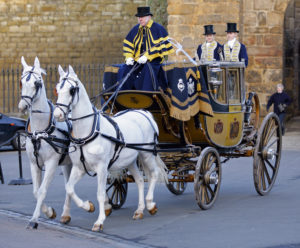He doesn’t know. (HBO)

Growing up in the Northumbrian village of Seaton Delaval, I lived in the shadow of the old aristocracy. The Delavals had hailed from Laval in the Loire valley, coming over with the Conqueror in the 11th century to settle the dangerous earldom of Northumbria and pacify the local Anglo-Saxons. In the 18th century, George Delaval, an admiral who had made his fortune as a diplomat, hired the famous John Vanbrugh to completely rebuild the mouldering family pile into the stately grandeur of the “Geordie Versailles”: Seaton Delaval Hall.
The Delavals are no longer in residence, though. When the male line died out in 1814, the estate passed through marriage to the Astleys of Melton Constable in Norfolk — holders of the ancient barony of Hastings — and that’s why, as well as working for Edward Delaval Henry Astley, 22nd Baron Hastings, in the gift shop of his stately home, I spent my youth hanging out in Astley Park, collecting glasses in the Astley Arms or waiting for the bus on Astley Road to attend Astley High. (Our school’s local rivals at Ridley High were named for the viscounts who’d turned their Blyth fiefdom into a Victorian boomtown, and whose scion has just stood down from the House of Lords.)
“The feudal tradition is strong in Northumberland,” wrote the sociologist Henry Mess in 1928, and well into the 20th century, half of the county was held in great estates of over 10,000 acres. This was in part a legacy of the way the Far North of England had been governed in the Middle Ages. Being far from the royal centres of power in the South, and on the frontier with the usually hostile Kingdom of Scotland, a caste of Northumbrian warlords (and, uniquely in Durham, a Prince Bishop) were given quasi-royal authority to muster armies, hold courts, and punish disobedience. As Parliament treated the defence of the border as a purely local affair, and never raised any taxes for this purpose, they relied on the few northern magnates and their retainers, whom they compensated by adding barony to barony and office to office — until, by the 14th century, the greater part of England north of the Trent was held by the three great Houses of Neville, Lancaster and Percy.
The greatest of the blue-blooded Northumbrian magnates were the Earls, and later the Dukes, of Northumberland. One history of the House of Percy has noted that in the tumultuous North, the “Southern king’s writ hardly ran. In Percy country, there was Percy law backed by a Percy army paid for by Percy money”. The dynasty began with a Norman knight from Calvados who was granted lands in northern England. In the following centuries the family’s fortunes rose and fell with the vagaries of court politics, but they always had their Northumbrian stronghold at Alnwick Castle, from which they dominated the lands from the Tweed to the Tyne — with the assistance of lower-ranking armigerous families like the Delavals of Seaton.
By the 18th century the male line had died out, and, in an aristocratic sleight of hand, Sir Hugh Smithson — an obscure but wealthy Yorkshire baronet who had married a descendent of the last Percy Earl of Northumberland — assumed the famous surname and was elevated to ducal status. (Marcel Proust was fascinated by the sonority and evocation of high lineage of certain ancient titles and was always delighted when he came upon the name of the Duke of Northumberland, which he thought had a “sort of thunderous quality”.)
Not all of England’s landed gentry had the good luck to find that their estates contained colossal mineral wealth, and as David Cannadine showed in The Decline and Fall of the British Aristocracy, the 20th century saw them lose a generation of sons in the First World War — as well as much of their prosperity, prestige and power, as they were assailed by death duties and democratic politics. It wasn’t long after Lloyd George’s famous speech in Newcastle in 1909 — where he quipped that “a fully-equipped duke costs as much to keep up as two Dreadnoughts; and dukes are just as great a terror” — that the House of Lords lost its powers of veto over the commons, a key watershed in British history.
But while other great houses struggled to repel these assaults on their privileges, this was not the fate of the Kings of the North. As Henry Mess pointed out, “there is not the sharp divorce between feudalism and the new industrialism which is found in most other areas”. For the vast landholdings of the Percy dukes included some of the richest coalfields in Britain. This made their fortune and saw them take their place in the North East among a new industrial aristocracy of sharp-elbowed “Lords of Coal” — a group so wealthy that at her wedding to the Scots nobleman John Lyon in 1767, Mary Eleanor, the daughter of the Durham coal baron Sir George Bowes, was probably the richest heiress in Europe. The dynasty they founded led directly to the marriage of Elizabeth Bowes-Lyon to the Duke of York in 1923: Queen Elizabeth II carries the DNA of hard-nosed Tyneside coal-owners.
The Percy family has survived setbacks. When George Orwell wrote in The Lion and the Unicorn that the “English ruling class are morally fairly sound” because “in time of war they are ready enough to get themselves killed”, he probably had in mind Lieutenant Alan Percy, the 9th Duke of Northumberland, who, in an odd echo of Harry Hotspur, fell leading a bayonet charge by the Grenadier Guards on the retreat to Dunkirk. The death of the playboy 11th Duke in 1995 after an amphetamine overdose was another blow. But the Percys endured by diversifying their coal wealth into a vast property portfolio, which has secured their place in the Sunday Times Rich List ever since.
Certainly in comparison to, say, the Australian-born 13th Duke of Manchester, who was jailed for burglary in Las Vegas in 2016, the Percy family maintains a certain Edwardian grandeur, with their great castle in the country and Syon House, opposite Kew Gardens: a luxurious seat in the capital. Indeed, few places could match the Ruritanian splendour of Lady Melissa Percy’s marriage in 2013 when she travelled with her father Ralph (“Rafe”), the 12th Duke, through Alnwick with a retinue of liveried footmen in the yellow state coach that had carried the 3rd Duke of Northumberland to the coronation of the Bourbon King Charles X in Reims in 1825.

The Percy family still maintains a visible presence in the public life of the region. Among other patronages, the Duke of Northumberland is the President of the Charitable Community Foundation, and his wife is the Lord Lieutenant of the county of which she is the Duchess. There was even a charity football match at St James’ Park in 2007 between the North and South of the region, where star players such as Alan Shearer and Niall Quinn turned out under the respective colours of the Duke of Northumberland and the Earl of Durham to raise money for the Prince’s Trust. But the longevity of Northumbrian aristocrats like the Percys of Alnwick has been a story of adaptability — and alliance.
On Hood Street in Newcastle, just near the Theatre Royal, stands the graceful premises of one of the oldest private members clubs in the world. “The Northern Counties” was founded in 1829 by the nobility and gentry of Northumberland and Durham, and a painting on the Club’s main staircase shows a gathering of red-tailcoated Northumbrian grandees in the Fifties, including the Duke himself, with Viscounts Ridley and Allendale, and Field Marshal Sir Francis Festing (whose son Matthew became, in 2008, the Prince and Grand Master of the Order of Malta) — alongside representatives of the local monied classes who’d gentrified themselves through the coal trade.
It’s somehow apt, therefore, that the family with the greatest fossil fuel-based wealth of all now has a major presence in the birthplace of carboniferous capitalism. When the Duke of Northumberland’s niece Lucy Cuthbert married the Saudi Prince Khalid bin Bandar bin Sultan Al Saud in 2011, few could’ve predicted that this would foreshadow the purchase of Newcastle United by the Public Investment Fund of Saudi Arabia ten years later. And it was striking, too, to observe that at the first match at St James’ Park after the Saudi takeover in October 2021, there in the director’s box next to the club’s new chairman, His Excellency Yasir Al-Rumayyan, were representatives of the old and new Geordie aristocracy, as the 5th Viscount Ridley took his place alongside the famous presenting duo (and Ambassadors of the Princes Trust): Anthony McPartland and Declan Donnelly.
As they entered the 21st century, the Percys could justifiably look out from the ramparts of Alnwick Castle with some confidence, knowing that if they face a cashflow problem they can always look down the back of the sofa for a spare Raphael. And yet the deference that they once enjoyed — and expected — is harder to sustain. When the 5th Duke’s tenants gathered for their annual dinner in 1859 they could still state their loyalty to the Percys with unfeigned enthusiasm:
Those relics of the feudal yoke
Still in the north remain unbroke:
That social yoke, with one accord
That binds the peasant to his Lord…
And yet just this year The Times reported a “second peasants revolt” as the citizens of Amble mustered in defiance of the Duke’s plans to build new homes on an area of common land. The relics of feudalism may live on in Northumberland, but the ties of lord and peasant, it seems, have started to fray.










Join the discussion
Join like minded readers that support our journalism by becoming a paid subscriber
To join the discussion in the comments, become a paid subscriber.
Join like minded readers that support our journalism, read unlimited articles and enjoy other subscriber-only benefits.
Subscribe